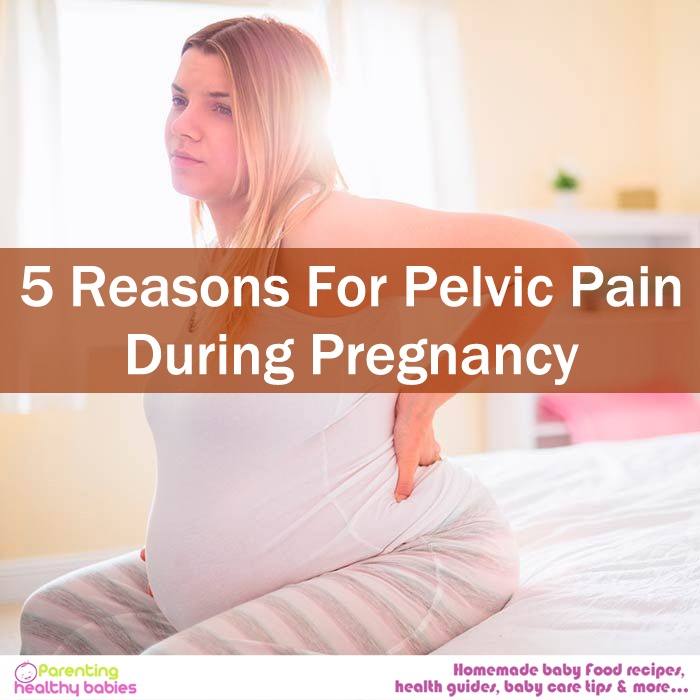Pelvic pain or Pregnancy-related Pelvic Girdle Pain (PPGP) is a symptom of pregnancy. It can result due to a change in hormone levels to relaxed muscles and ligaments for the uterus’ growth to many others. Some pregnant women may have mild pelvic pain, while with others, the pain could be severe during the first trimester of pregnancy. At times, the pain could point to a dangerous health condition like kidney stones or Symphysis Pubis Dysfunction (SPD).
Symptoms
Though PPGP does not harm the baby, yet it causes severe pain around the pregnant woman’s pelvis, which makes normal and everyday movement extremely difficult. The symptoms of this condition vary from woman to woman in severity. They could include:
- Pain in the middle of the pubic bone at the front
- Pain on either side of the lower back or on both sides
- Pain between the vagina and perineum
Pain can also radiate from these areas to the thighs and some women also report a clicking or grinding sound in the pelvic region. This pain can be felt when walking, climbing stairs, standing on one leg or turning sides in bed. It can worsen when a woman uses both legs together to get out of a car.
Read More: Home Remedies For Back Pain During Pregnancy
The ideal candidate for PPGP
Usually, one in five pregnant women can suffer from this condition. Though no one still knows why women are affected by this, yet it is believed that PPGP is linked to several conditions, such as a history of a damaged pelvis, the weight of the baby, its position, or the uneven movement of the pelvic joints.
Factors for developing PPGP:
- A history of pain in the lower back or pelvic girdle
- A history of pelvis injury due to a fall or accident
- A history of PPGP in an earlier pregnancy
- Having a physically strenuous job
5 Reasons For Pelvic Pain During Pregnancy
Causes for PPGP: The factors of PPGP and their severity can vary depending on the stage of a woman’s pregnancy. There are many causes of this condition, but chiefly, they are:
1. Symphysis Pubic Dysfunction (SPD)
This is a common condition experienced by 45% of all pregnant women. In this condition, the body produces an excess of the hormone called relaxin, which is instrumental in loosening the joints. It causes a lot of pain in the pelvis as the ligaments stretch and bones move externally. For relief from this condition, pelvic support belts, Kegel exercises and pelvic-tilt exercises are best.
2. Expanding uterus
Women feel a cramp in the pelvic region between the eighth and 12th weeks of pregnancy. The pain is akin to menstrual pain. This pain arises due to the uterus expanding. It pushes the muscles and organs to accommodate the foetus. This type of pain is usually experienced in the first pregnancy. As the uterus separates the pelvic joints and muscles, the pain intensifies.
Read More: 5 Herbs For Strengthening The Uterus
3. Braxton Hicks Contractions
These contractions are also known as practice contractions. They are identified by pressure that pregnant women feel in the pelvic region, which come and go though painlessly. Braxton Hicks contractions occur randomly and are painless. This practice contraction is seen in the 20th pregnancy week and is due to dehydration.
4. Ovarian Cysts
When there’s a change in the way ovaries release eggs, ovarian cysts develop. They are benign and harmless, and enlarge during pregnancy. Pregnant women with ovarian cysts are usually in pain due to cysts because the uterus that’s constantly growing puts pressure on the ovaries.
Read More: 11 Home Remedies for Polycystic Ovary Syndrome
5. Urinary Tract Infection or UTI
About 10% of all pregnant women are usually affected by UTI at any point of their pregnancy. This can cause pain, inflammation during urination, blood in urine and abdominal and pelvic pain.
Chronic causes include miscarriage, uterine rupture, preterm labour, ectopic pregnancy, uterine fibroid and appendicitis.
Read More: UTI in Women: 11 Must Know Home Remedies
Self-help techniques:For relief from pelvic pain, try the following:
- Take a warm water bath and allow the water to fall on your back.
- Wear a pelvic support, that can prevent the uterus from pressing down on the pelvis.
- Wear low-heeled shoes and ensure they have good arch support.
Conclusion
Pregnant women with pelvic pain go through excruciating pain but that doesn’t mean they have to bear it. There are ways of experiencing relief by using kitchen remedies and other allopathic means. Speak to your gynaecologist and seek immediate advice and help.
